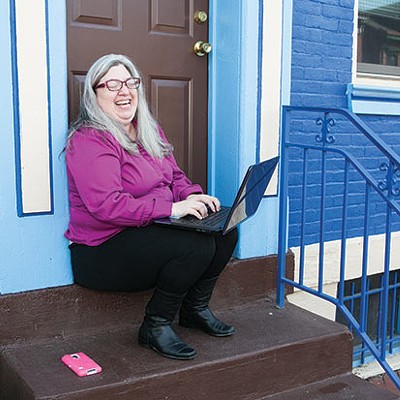We're here in Propel School, McKeesport, and Emmai Alaquiva is working the crowd, a dozen middle-schoolers being introduced to the intricacies and idiosyncrasies of hip hop.
"You've got your pencils," the tall thirtysomething says. Stylishly dressed in a brown fedora, pink shirt and striped pink-and-gray rep tie, he's strong, supportive, very much in charge. The kids adore him.
"We're going to do our math in the music workshop," he says. "You need to turn your math skills on. Who knows how many beats in one bar?"
Various suggestions fly around the room.
"Let's add it up," Alaquiva says, tapping his head. "You've got to use your brains."
After a bit of back-and-forth, some hip-hop lyrics and beats begin to emerge. The students read from their notes, reaching inside of themselves to tell stories.
"This is good," Alaquiva nods and smiles. "This is where we come together as a team."
By the time he was their age, growing up in Wilkinsburg, Alaquiva knew that he wanted to record music. By mowing lawns and shoveling snow, he saved enough money to create his own bedroom recording studio. Entirely self-taught, he listened assiduously to such sound pioneers as Alfred Lion and Rudy Van Gelder, who recorded virtually every great mid-century jazz artist in crisp, often startling detail.
A decade ago, Alaquiva graduated from tinkering and opened his own recording studio, Ya Momz House. Stuffed in a suite of offices on the second floor of East Liberty's Werner Building, Alaquiva's outfit has amassed an enviable list of blue-chip clients for whom he produces sound, video and webcasts: the Cultural Trust, WAMO, UPMC, the August Wilson Center and many more.
Not content with working with grown-ups, he's reached back -- to his own youth, and to today's youth. As a young teen, Alaquiva recalls, hip hop "gave me something I could hold onto." Now he's employed hip hop's natural rhythms, its capacity for speaking from the heart, to draw in kids of all races and backgrounds.
While no one will ever confuse hip hop with Handel, Haydn or Herbie Hancock, its genius lies in its simplicity and honesty, its power to channel kids' energies.
The accoutrements don't hurt either: new names, new identities -- all self-forged and perfect ice-breakers for kids who may be reticent to come forward and say, well, anything. Further, hip hop's genuine folk-artsiness -- think Grandma Moses in gangsta gear -- makes for a brilliant first step for kids who need a good first step.
Working with area schools, Alaquiva has developed Hip-Hop On L.O.C.K. (for Leadership development, Organizational skills, Cooperative economics, and Knowledge of the music business). The program immerses what he calls "cohorts" of students for eight-week programs, during which they write, produce, record, mix and videotape their own projects. Along the way, students also study with photographers, graphic designers and videographers -- as well as instructors teaching math, science and writing.
Propel's charter-school programs have signed on already. So have the Pittsburgh Public Schools, Quaker Valley, Sto-Rox, even Winchester Thurston. Explains Alaquiva, "They like our message: self-respect and responsibility, empowering and educating young people. They also buy into the concept that being able to put people together in the same room, having them connect in a way they never thought possible, then taking that connection and inspiring the rest of the world -- that's art at its finest."
What's more, Alaquiva and his chorus of hip-hop voices literally play all over the world. Among his other projects is L.O.C.K.down Radio, an hour-long, community-based hip-hop show broadcast on WRCT (and on www.lockdownradio.com), and The Waffle Wopp, an hour-long web-TV show that originates at the Waffle Shop downstairs from his offices.
That's today. Tune in tomorrow and there may be 40 more programs. "We've grown astronomically," Alaquiva says. "In 2007 we were working with 16 students. Now there are more than 1,000. Because we bring a message of integrity and quality, of diversity and inclusion, we've been able to soar."
Shutting down the editing programs he's been using, Alaquiva excuses himself. There's a video shoot in the Strip District that he must supervise. "I love working with kids," he says, moving toward the door. "There's a voice, an amplifier in these young people's hearts. The passion that I see when I look into a young's person's eyes reminds me of why we're here."



















